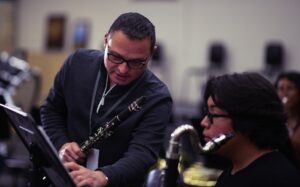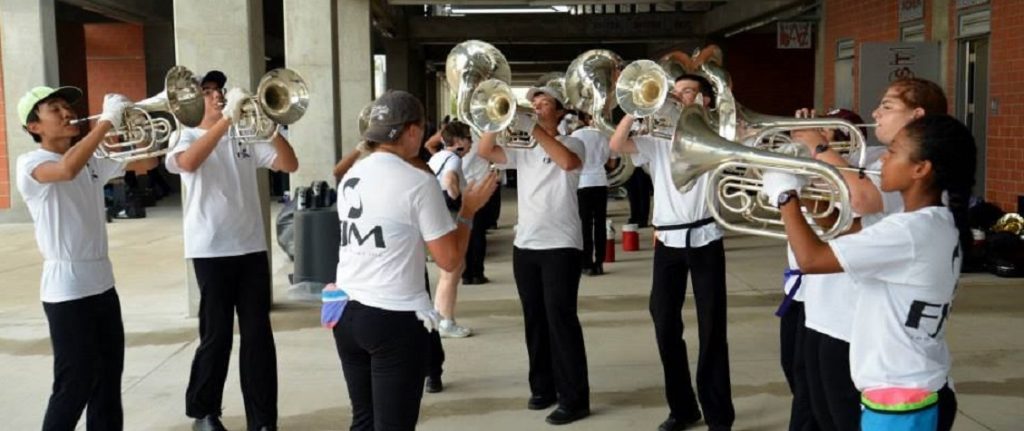Tagged Under:
10 Tough Questions from Student Leaders
Student leaders are given the opportunity to ask the questions that they may be afraid to ask their band directors at the BOA Summer Camp.
Several years ago at the Bands of America Summer Camp (formerly Music for All Summer Symposium), Educational Psychologist Fran Kick had an idea to engage with the leadership weekend attendees — ask an anonymous question about anything that you have always wanted to ask your band director. Since then, leadership weekend attendees are given this same opportunity.

Some students ask very specific questions that only their band directors can answer. However, most attendees ask questions that are relatable to any student. These anonymous questions are shared with a partner and rated. This process is repeated several more times. Questions with the highest ratings agreed upon by the campers are then organized and answered by the leadership weekend clinicians, who draw from their varied experiences as teachers, facilitators and even color guard choreographers.
Here are 10 memorable student questions and our answers.

Q1: How do I let go of the fear of not being good enough?
As a young band director, this question frustrated me. When I worked at my first school, I remember telling the seasoned head band director, “I absolutely HATE being a YOUNG band director.”
Here’s what I do. I actually try NOT to think of the big picture. If I think about all the things that I must do for a performance or a Midwest recording or a BOA Regional, my head would explode. Instead, I look at things as simply following procedure. For me, this means to first set a desired outcome: How, what, where, when do we want to play? Next, set as specific a timeline as possible — day of a show, one day out, one week out, two weeks out, one month out, etc. This timeline offers digestible chunks that I can achieve in very fixed sets of time. Finally, I put all this in one place, such as a document or a calendar, and I share it with everyone involved so we can hold each other accountable.
Once I break things down, I don’t feel lacking in my abilities. This process refocuses everyone’s efforts into how WE can achieve great music-making. (answered by Bobby Lambert)

Q2: How do I handle the intense male culture as a female leader?
As a man, I can’t imagine what this truly feels like, but I can understand how prevalent and powerful it can be. I am the father of two daughters, and I already see the toxic culture that permeates gender stereotypes. I try to cooperate completely with my female Wando High School Band counterpart, Lanie Radecke. We are both band directors (along with Dr. Andrew Blair), and we each have opinions and desires that weigh equally into the equation. Also, we each have our specialities, but we aren’t the only one, so there is redundancy. For example, I NEVER run a music rehearsal with the full marching band. That is always Lanie Radecke. If I want to change something, I ask her. Awareness and sincere kindness, not placation, are key. (Bobby Lambert)
Q3: How do you gain respect from section leaders/friends when I become a leader?
Communicate honestly and with as little emotion as possible. We often take every action from someone else as being calculated, when in actuality, that is not the case. Ask questions rather than give commands. Only ask someone to take on a task that you are willing to do yourself. (Bobby Lambert)
Q4: What is the best way to handle not having the best relationship with the other drum major?
See above. We don’t have to like one another to respect one another. We must be able to work together. If you can’t, then you should step down. Talk with your director as they often have the most insight into BOTH your personalities. However, you must be willing to take their criticism. In the end, if you truly care about the band, you can let go of some of the idiosyncrasies of your partner. (Bobby Lambert)

Q5: What do you do when you trust your band director with sensitive information, and they didn’t respond to it the way you thought they should?
First, ask yourself why your director would do that, and spend time in that place. If you can’t come up with an answer, go back to your director with kindness and sincerity. Try to see it from their point of view. If you are still struggling, go to another adult, namely a staff member or parent, to discuss. Do NOT involve other students because this is a sure way for your sensitive information to spread. That situation is a difficult one, but most solid resolutions are. (Jerell Horton)
Q6: How can I continue to participate in music if I don’t see it as a career?
Music is about life and experience. No one learns to be a band director or professional musician in high school or even during their undergraduate years. Through music, you have access to deepen the human experience. Music is a multifaceted experience — it is intellectual, it is physical, it is psychological and it is spiritual. No other activity brings that wealth of knowledge and experience to the table. This is why so many adults who are non-professional musicians still play in community groups and volunteer ensembles. Music is life and life is music. The longer you participate, the most connected you are to life. (Bobby Lambert and Jerell Horton)

Q7: I am facing a director change at my school. What role can I play in the transition?
Change is a part of life. The band room is a safe space, and let’s be honest, no one likes when change happens in our most comfortable space. Keep a couple of things in mind. First and foremost, take the time to get to know your new director and encourage your peers to do the same. Rapport is such an important element in the development of strong culture and the fostering of group achievement. It’s much easier to do the hard work with people who we really know.
Second, who knows the most information concerning your program? The people who have spent the most time in it — you! It might be a good idea to collect information from the leadership team that may be helpful to your new director, such as traditions and processes that are unique to your band. If your new director has a better perspective of the day-to-day dealings of the band program, the transition will be less stressful for everyone. The leadership team could present a list of items to your new director or schedule a meeting to discuss these things. Remember, your job is to relay information NOT to tell your director how to do their job. Any opportunity to establish a we/us environment will yield a great result. (Jerell Horton)

Q8: How do we combat older students/members who carry on with negative attitudes or harsh leadership tactics?
When dealing with negative attitudes, members or behaviors, I remind my students, “if you give an actor a stage, they will put on a show.” Most people will repeat behaviors that are allowed, acknowledged or celebrated. It’s hard to manage the social atmosphere of our music programs, but it simply comes down to deciding what you will and won’t accept.
Next, the leadership team must make the same decision. Once everyone is on the same page then the hard work begins. If you do not engage or allow space for negative talk, behavior or inappropriate leadership, the behavior will lessen and eventually end. This is a process that takes quite a bit of time, so once you start, do NOT abandon the process. You do not have to be ugly or unkind, just choose not to particip tate. You can even create a code language to help other student leaders stop buying tickets to the “negative” show. One of my favorites is “we don’t do that here.” (Jerell Horton)
Q9: How can I deal with the awkwardness that comes from working with people who auditioned for the leadership position that I currently have?
Let’s be honest. Everyone wants to be seen, heard and accepted. When it comes to choosing leaders, it is usually a difficult decision. Understand that your band director took the time to choose the proper skill set for the job. This doesn’t mean that the chosen person is the ultimate supreme ruler. It does mean that the chosen leader has now been tasked with making decisions that will help advance the goals of your school, band program and your band director.
I believe in a concept that I call “Lego leadership.” Everyone has a unique skill set that when shared with the people on the left and right, the entire group benefits. We are not all the same, and this fact is the strength of our groups. Keep this concept in mind, and take the time to recognize and acknowledge the great skill sets and beautiful brains that surround you. Instead of you (the leader) always displaying or evaluating a skill, allow those people who may have auditioned for your job to help in some way. Genuinely use these opportunities to acknowledge what your colleagues bring to the table. For example, if that same person has a great forward march and you’re working on that skill, let that person be the model or better yet allow them to lead the session. In this way, you are fostering a collaborative environment that can yield great success. (Jerell Horton)

Q10: As the Drum Major (or any student leader), how do I handle disagreements that may arise between other leaders?
One piece of advice that I share with my leaders is that you can always find a way to have difficult conversations filled with respect. The key to navigating these conversations is to first establish a neutral time and space. The rehearsal environment is not the best place to handle difficult conversations. It’s very important to temper emotions as much as possible in order to lessen the probability that someone will say or do something that is out of character.
Having good rapport with the leadership team will make difficult conversations easier to navigate, although that rapport does not make the problems go away. It may be a good idea to establish protocols for these types of conversations at the beginning of your season or during leadership training so that you will not have to “build the plane while flying.” Remember to include in your protocol the importance of mutual respect in conversation. There may be times when you may have to agree to disagree, but you must still work together for the good of the program. If you find that these strategies do not work, it may be necessary to involve your band director or appropriate staff member who may act as a mediator. (Jerell Horton)
_________________________________________________________
As you can see, most of these questions deal with how students perceive themselves and others, and how they can uncover their leadership potential. We encourage teachers to engage with students in conversations that allow students to communicate their fears, curiosities about leadership, and questions concerning culture. We know that our students will not all be professional musicians but they will all be professional people, and the band room is fertile ground to grow and nurture tomorrow’s leaders. For more information about the Bands of America Summer Camp Leadership Weekend please visit camp.musicforall.org.















